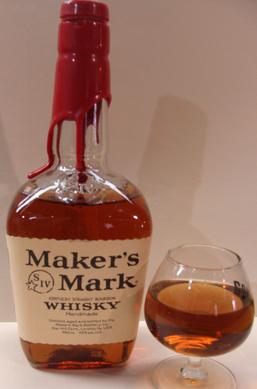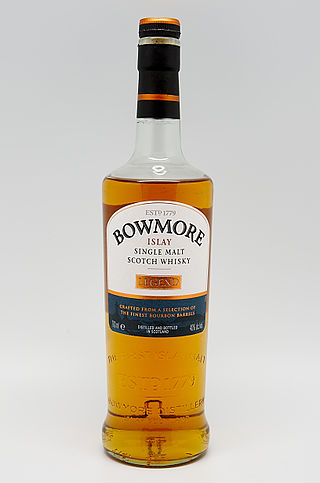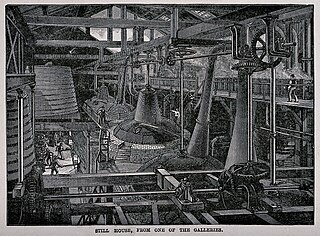
Scotch whisky, often simply called whisky or Scotch, is malt whisky or grain whisky made in Scotland.

Whisky or whiskey is a type of liquor made from fermented grain mash. Various grains are used for different varieties, including barley, corn, rye, and wheat. Whisky is typically aged in wooden casks, which are typically made of charred white oak. Uncharred white oak casks previously used for the aging of port, rum or sherry are also sometimes used.

Bourbon whiskey is a barrel-aged American whiskey made primarily from corn (maize). The name derives from the French House of Bourbon, although the precise source of inspiration is uncertain; contenders include Bourbon County, Kentucky, and Bourbon Street in New Orleans, both of which are named after the House of Bourbon. The name bourbon might not have been used until the 1850s, and the association with Bourbon County was not evident until the 1870s.

Single malt whisky is malt whisky from a single distillery.

Jack Daniel's is a brand of Tennessee whiskey produced at Jack Daniel Distillery in Lynchburg, Tennessee, which has been owned by the Brown–Forman Corporation since 1956.

A barrel or cask is a hollow cylindrical container with a bulging center, longer than it is wide. They are traditionally made of wooden staves and bound by wooden or metal hoops. The word vat is often used for large containers for liquids, usually alcoholic beverages; a small barrel or cask is known as a keg.
Finishing is the procedure that some whiskies undergo where the spirit is matured in a cask of a particular origin and then spends time in a cask of different origin Typically, the first cask is an American oak cask formerly used to mature bourbon. The second cask may be one that has been used to mature some sort of fortified wine, often sherry, though sometimes casks for port, madeira, or even red burgundy or chardonnay are used.

Maker's Mark is a small-batch bourbon whisky produced in Loretto, Kentucky, by Suntory Global Spirits. It is bottled at 90 U.S. proof and sold in squarish bottles sealed with red wax. The distillery offers tours, and is part of the American Whiskey Trail and the Kentucky Bourbon Trail.

Jim Beam is an American brand of bourbon whiskey produced at Jim Beam Distillery in Clermont, Kentucky, by Suntory Global Spirits.

Canadian Club is a brand of Canadian whisky produced by Suntory Global Spirits. Popularly known as CC, Canadian Club was created by Hiram Walker and Sons, an evolution of a brand around a product that took place over the second half of the nineteenth century. Hiram Walker merged with Gooderham & Worts, Ltd. in 1926, yielding Hiram Walker-Gooderham & Worts, Ltd.

Single barrel whiskey is a premium class of whiskey in which each bottle comes from an individual aging barrel, instead of coming from blending together the contents of various barrels to provide uniformity of color and taste. By contrast, some other whiskeys, even ones that are not blends, may be combined from more than one batch, or even from differing years to achieve consistency. The whiskey from each barrel is bottled separately, with each bottle bearing the barrel number and in most cases the dates for the beginning and end of aging. Each barrel is believed to contribute unique characteristics to the finished whiskey.

Malt whisky is whisky made from a fermented mash consisting of malted barley. If the product is made exclusively at a single distillery, it is typically called a single malt whisky. Although malt whisky can be made using other malted grains besides barley, those types are not called malt whisky without specifying the grain, such as rye malt whisky or buckwheat malt whisky.

Rum is a liquor made by fermenting and then distilling sugarcane molasses or sugarcane juice. The distillate, a clear liquid, is often aged in barrels of oak. Rum originated in the Caribbean in the 17th century, but today it is produced in nearly every major sugar-producing region of the world.

Stranahan's Colorado Whiskey is a 94 proof, small batch whiskey distilled in Denver, Colorado. Stranahan's was the first modern microdistillery to legally make whiskey in Colorado, and an early craft whiskey distiller in the United States.

Nelson's Green Brier Distillery is a whiskey distillery located in downtown Nashville, Tennessee that produces different varieties of Tennessee whiskey and bourbons. The distillery offers daily public tours and tastings as well as a large mercantile shop with bottles, barware and apparel available for purchase. In July 2023, Nelson's Green Brier Distillery opened a newly renovated distillery restaurant and full-service bar at their 1414 Clinton St. Nashville, TN 37203 location. The same facility also now offers four new private event and dining spaces available to rent for corporate functions, weddings and celebrations of varying sizes.
It has been common practice in the whisky industry for more than a century for distilleries to sell barrels of whisky to blenders and independent bottlers as a means of making additional income. In fact, some distilleries exist solely to serve independent bottlers, and do not market any brands themselves.
Straight whiskey, as defined in United States law, is whiskey that is distilled from a fermented cereal grain mash to a concentration not exceeding 80% alcohol by volume (abv) and aged in new charred oak barrels for at least two years at a concentration not exceeding 62.5% at the start of the aging process. Domestic sales of straight whiskey surpassed 27 million 9-liter cases in 2021.
Benjamin Prichard's Tennessee Whiskey is a brand of Tennessee whiskey produced in the small community of Kelso, Tennessee in the United States. Although it is produced by one of only two distilleries operating in Lincoln County – and its unaged variation is named Lincoln County Lightning – Prichard's is not produced using the Lincoln County Process. Due to a special grandfathering exemption under a Tennessee law enacted in 2013, the Prichard's distillery in Kelso is the only producer allowed to label its product as "Tennessee Whiskey" without using this process. Prichard's whiskey is produced entirely using pot stills rather than column stills.

Amrut is a brand of Indian single malt whisky, manufactured by Amrut Distilleries. It is the first single malt whisky to be made in India. Amrut (अमृत) or amrit is a Sanskrit word which can be translated as "nectar of the gods", "nectar of life", or "drink of the gods". The company translates it as "Elixir of Life". The brand became famous after whisky connoisseur Jim Murray gave it a rating of 82 out of 100 in 2005 and 2010. In 2010 Murray named Amrut Fusion single malt whisky as the third best in the world. John Hansell, editor of American magazine Whisky Advocate, wrote that "India's Amrut distillery changed the way many think of Indian whisky – that it was, in the past, just cheap Scotch whisky blended with who knows what and sold as Indian whisky. Amrut is making whisky, and it's very good".

The following outline is provided as an overview of and topical guide to whisky:
















